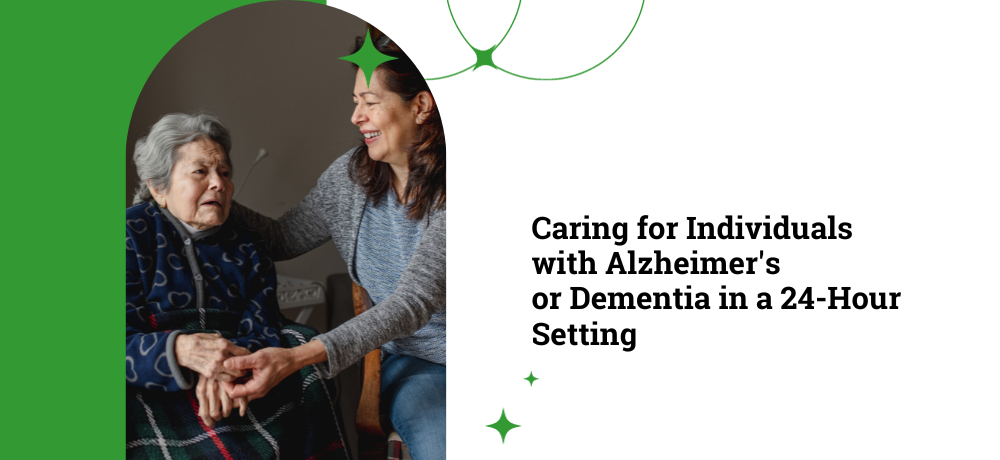
Caring for individuals with Alzheimer’s or dementia in a 24-hour setting is a challenging yet deeply rewarding responsibility. It requires patience, understanding, and a commitment to preserving the dignity and quality of life of those who may be struggling with memory loss and cognitive decline. In this comprehensive guide, we will explore the essential aspects of providing care in a 24-hour setting for individuals with Alzheimer’s or dementia. Whether you’re a professional caregiver, a family member, or someone interested in learning more about this topic, these insights will help you navigate the complexities of dementia care and ensure that those you care for lead fulfilling lives.
Understanding Alzheimer’s and Dementia
Alzheimer’s Disease:
Alzheimer’s disease is a progressive neurodegenerative disorder that primarily affects memory and cognitive function. It is the most common cause of dementia. In Alzheimer’s, abnormal protein deposits (amyloid plaques and tau tangles) accumulate in the brain, leading to the gradual death of brain cells and a decline in cognitive abilities. Common symptoms include memory loss, confusion, language problems, and changes in mood and behaviour. There is currently no cure for Alzheimer’s, but various treatments and interventions can help manage its symptoms and slow its progression.
Other Forms of Dementia:
Dementia is an umbrella term for a range of cognitive impairments that interfere with daily functioning. While Alzheimer’s is the most prevalent type of dementia, other forms include vascular dementia, Lewy body dementia, frontotemporal dementia, and mixed dementia, among others. Each type has distinct underlying causes and symptom patterns. Vascular dementia, for instance, results from impaired blood flow to the brain, often due to strokes, while frontotemporal dementia affects the frontal and temporal lobes of the brain, leading to changes in behaviour and personality. Recognizing the specific type of dementia is important for providing appropriate care and treatment.
Creating a Safe and Comfortable Environment
Modifying Living Spaces:
Adapting the living environment is crucial for ensuring the safety and well-being of individuals with Alzheimer’s and other dementias. This may involve removing tripping hazards, installing handrails, securing cabinets containing potentially harmful items, and labelling rooms or objects to aid orientation. Creating a familiar and organized living space can reduce confusion and anxiety in dementia patients.
Promoting Comfort:
Comfort is essential for individuals with dementia. This includes maintaining a consistent room temperature, ensuring proper lighting, and providing comfortable seating and bedding. Familiar and soothing objects, such as photographs, favourite blankets, or soft music, can help promote a sense of security and reduce agitation. Creating a peaceful atmosphere with minimal noise and visual clutter is also beneficial for the comfort of those with dementia.
Building Strong Caregiver-Patient Relationships
Communication Strategies:
Effective communication is vital when caring for someone with dementia. Caregivers should use clear, simple language and maintain a calm and patient demeanour. Non-verbal communication, such as eye contact and gentle touch, can convey understanding and empathy. Active listening and responding to the individual’s feelings and needs are key to establishing trust and rapport.
Emotional Well-Being:
Emotional well-being is critical for both the patient and caregiver. Dementia patients may experience frustration, anxiety, and confusion, which can be distressing. Caregivers should provide emotional support, validate the person’s feelings, and offer reassurance. Engaging in meaningful and positive interactions, such as reminiscing about past experiences, can enhance emotional well-being and maintain a sense of identity and dignity for the individual with dementia.
Structured Daily Activities and Routines
Daily Schedules:
Establishing a structured daily routine can help individuals with dementia feel more secure and less anxious. This routine may include regular mealtimes, exercise, and consistent sleep patterns. Simple visual cues or a daily schedule board can assist in keeping track of the day’s activities. Having a predictable schedule can reduce the confusion and disorientation often experienced by those with dementia.
Meaningful Activities:
Engaging in purposeful and enjoyable activities is beneficial for cognitive and emotional well-being. These activities should align with the person’s interests and abilities. They can include arts and crafts, gardening, music, puzzles, or even simple household tasks. Meaningful activities provide a sense of accomplishment, reduce boredom, and help maintain cognitive function to some extent.
Caring for individuals with Alzheimer’s or dementia in a 24-hour setting is a significant undertaking. With the knowledge and support provided in this blog, you can confidently navigate this journey, providing the best care possible for your loved ones facing these challenging conditions.
Get in touch with Trinity In-Home Care today! To learn more about the services we offer, check out our website by clicking here. To contact us, please click here or call us at (513) 281-8000.


